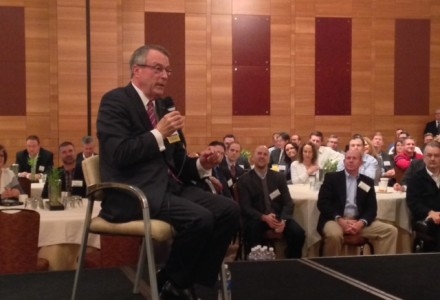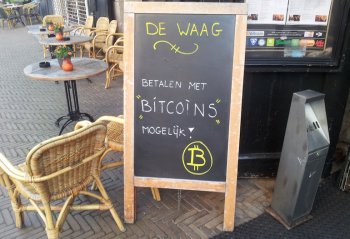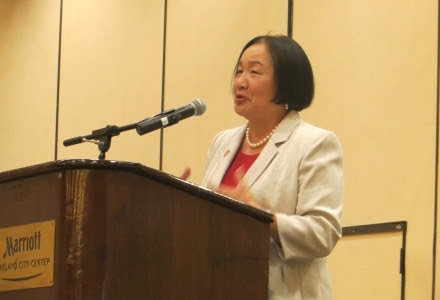|
We thought we knew what creative work space was, but Seattle is so far ahead of the game that our idea is already cliche. That's why we chose now to host our first-ever Seattle Creative Office Space Summit, at the Hyatt Olive 8 on May 21. (Sign up here.)  Lake Union Partners principal Pat Foley, who will be a panelist, tells us creative office space comes in many forms—it wouldn't be particularly creative, after all, if the design went according to a creative checklist. It's mostly thought of as historic buildings with exposed brick and heavy timber and so on, but it can be in newly constructed buildings if they're designed properly. Mostly the space needs to be authentic, Pat says.  Open work space is still a major component, but private space for meetings, phone calls, and lounge areas is equally important, Pat adds. He also believes tenants in creative spaces need to be within walking distance to good retail and food and drink. (No matter how hard you pound on a vending machine, it won't serve a cold brew during happy hour.) “We approach retail in office development the same way we would in a mixed-use multifamily building,” he says. “Good retail in many respects becomes an extension of the office space.”  Another Creative Office panelist: True Fabrication co-founder Dhruv Agarwal (snapped with fellow co-founders Ben Inadomi and Nik Patel), who will tell us about the cool HQ space occupied by his company—which sells wine accessories, wine bags, corkscrews, and aerators. Also on the panel will be execs from Dunn + Hobbes, Impact Hub Seattle, Graham Baba, and WeWork. Register now. |
 |
Real Estate Skills Most in Demand |
||
|
Cool office space is one thing, but how do you fill the seats with real estate's best and brightest? Terra Search Partners senior principal Linny Simkin says the red-hot market here keeps her firm—which specializes in real estate exec recruitment—hopping. The skillsets most in demand: proven acquisition and development specialists who can source deals, ideally off-market, she tells us. |
Other sought-after exec skills: recognizing value, negotiating, and closing deals. (Coffee is for closers goes double in Seattle.) Linny adds that there's always demand for quality asset and property management talent who can drive portfolio value and NOI. “Those skills are more recession-proof,” she says. SF-based Terra recently promoted Linny in the firm's Seattle office. |
|
 |
Kemper's Next Act Eastside legend Kemper Freeman is going to be even more legendary. On Friday, Kemper (snapped at a Bisnow event late last year), will detail plans for the expansion of Lincoln Square and Bellevue Square and the grand opening of The Studio Expansion Experience Center, his company's high-tech leasing sales office; Kemper calls it a multi-million dollar “experiential” sales center unlike any in the country. Stay tuned for full coverage in our next edition. |
 |
Buy a Building With Bitcoin? |
||
 Why do sellers like buyers that can close quickly and all cash? The closing process is brutally long, mortgage contingencies are nerve-wracking, and there's too much money going to too many third parties. Know what would make the process even quicker? A digital currency like Bitcoin, according to the Harvard Business Review. Bitcoin's advantages as a smooth peer-to-peer payment system are well known, and it's not a huge leap to envision the currency simplifying the sale of commercial property. Its public ledger system (the blockchain) would streamline due diligence with verification and record of the building's past ownership, inspections, certifications, leases, etc., and both parties could transfer title with a tap on an iPad. (Plus cash is rife with bacteria.) |
 Bitcoin could also improve transparency of contracts (like leases) and its cryptography could lead to virtual identity management (goodbye ugly passport photos), the article says. We're not sure what the currency might mean for brokers and lawyers, but it's definitely technology to watch and harness, no matter where you operate in the commercial real estate industry. (Though it might change negotiation tactics, which often rely on shrouds of mystery, and passing pieces of paper across the table.) It would take years and a solid rebranding campaign for Bitcoin to reach these proposed heights, along with a trustworthy track record and improved operability. Do you think it could work? We want to know. Tell dees.stribling@bisnow.com |
|
 |
We Got Your MayorsBisnow has been busting out the mayors for you: Our recent Oakland, Baltimore, and Denver State of the Market summits were all keynoted by the local head honchos. (Plural: Hizzonii?) Above, Denver Mayor Michael Hancock highlighted how his city is one of the premier growth markets. The crowd of 350 agreed, saying the Denver commercial real estate economy is back to a 7 or 8 (with 2007 being a 10 and 2009 being a 1).  400 attendees saw Oakland Mayor Jean Quan flaunt her city's titles: Top turnaround city, home to the fastest-selling homes in the US, and No. 5 best city for attracting VC. She's particularly proud of Oakland's international prowess, noting the $1.5B Chinese investment for the Brooklyn Basin project—a signature property on the water. The restaurant scene isn't too bad either; "If you're a foodie like me,” she says, this is the place to be. (We'll just have to do extensive research on that and get back to you.) Baltimore Mayor Stephanie Rawlings-Blake celebrated progress toward her goal of 10,000 new families in the city: 4,200 housing units have been created in Baltimore City since 2010, and 3,700 are in the pipeline. (So tell your kids to move out already.) Apartment development and conversion incentives should keep the momentum going, but a city can't grow unless the people who already live there have a reason to stay. Hers: She'll continue to cut residential property taxes; the City is issuing RFPs for City-owned properties in the Bromo Arts District; and her administration has $1.1B lined up for school construction. |
 |





